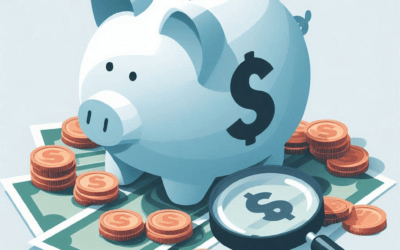Table of Contents
Toggle30 Top Ways to Save Money: A Comprehensive Guide
Saving money can seem like a daunting task, but with the right strategies, anyone can build a healthy financial cushion. Here are 30 immersive and engaging ways to save money.
1. Create a Budget and Stick to It
A budget is your financial roadmap. List all your income sources and expenses, categorize them, and set limits. Use apps like Mint or YNAB (You Need a Budget) to track your spending in real-time. Regularly reviewing your budget helps you stay on course and make adjustments as needed.
Pro Tip: Review your budget monthly and adjust categories as necessary to reflect your spending habits and goals.
2. Automate Your Savings
Set up automatic transfers from your checking account to your savings account. Treat your savings like a bill you must pay. This way, you’re less likely to spend money impulsively, and your savings will grow without effort.
Pro Tip: Schedule the transfer on your payday to ensure that saving is your first priority.
3. Reduce Utility Bills
Simple changes like switching to energy-efficient appliances, using programmable thermostats, and sealing leaks can significantly reduce your utility bills. Unplug electronics when not in use and consider solar panels for long-term savings.
Pro Tip: Use energy-monitoring devices to track and manage your household energy consumption.
4. Cook at Home
Eating out is convenient but expensive. Cooking at home allows you to control ingredients and portion sizes, leading to healthier and cheaper meals. Plan your meals, buy groceries in bulk, and try batch cooking to save time and money.
Pro Tip: Prepare meal plans and shopping lists to avoid buying unnecessary items.
5. Use Cashback and Reward Programs
Take advantage of cashback and reward programs offered by credit cards, online shopping platforms, and grocery stores. These programs give you a percentage of your spending back, which can add up over time.
Pro Tip: Use a cashback comparison site to find the best deals before making a purchase.
6. Cut the Cable
Streaming services like Netflix, Hulu, and Amazon Prime are more affordable than traditional cable. Evaluate your viewing habits and choose the services that best fit your needs. Many networks also offer free online content.
Pro Tip: Regularly review your subscriptions and cancel any you don’t use frequently.
7. Buy Generic Brands
Generic brands often offer the same quality as name brands at a lower price. Whether it’s groceries, medications, or household items, opting for store brands can save you a significant amount of money over time.
Pro Tip: Compare ingredient lists and customer reviews to ensure you’re getting comparable quality.
8. Use Public Transportation
Public transportation can be cheaper and more eco-friendly than owning a car. If feasible, consider biking or walking for short distances. Look into transit passes or carpooling to further reduce costs.
Pro Tip: Track your travel expenses and compare them to the cost of owning and maintaining a car.
9. Refinance Loans
Refinancing your mortgage, student loans, or auto loans can lower your interest rates and monthly payments. Shop around and compare offers from different lenders to find the best deal.
Pro Tip: Use online calculators to determine potential savings before refinancing.
10. Limit Credit Card Use
Credit cards can lead to overspending due to the ease of use. Stick to cash or debit cards for everyday purchases to avoid accumulating high-interest debt. If you use credit cards, pay off the balance in full each month.
Pro Tip: Use credit cards that offer cashback or rewards on essential purchases and pay off the balance immediately.
11. Shop with a List
Impulse buying can derail your budget. Always shop with a list and stick to it. This helps you avoid unnecessary purchases and focus on what you actually need.
Pro Tip: Review your list before shopping to ensure you’re not buying items you already have.
12. Cancel Unused Subscriptions
Regularly review your subscriptions for streaming services, magazines, gym memberships, etc. Cancel any that you don’t use frequently. There are apps like Trim and Truebill that can help you track and cancel subscriptions.
Pro Tip: Set reminders to review your subscriptions every few months.
13. DIY When Possible
Do-it-yourself projects can save you money on repairs, home improvement, and even gifts. There are countless online tutorials and videos that can guide you through DIY projects.
Pro Tip: Start with small projects to build your skills and confidence before tackling larger tasks.
14. Negotiate Bills
Many service providers are willing to negotiate bills to retain customers. Call your internet, cable, or phone provider and ask for a lower rate or discounts. Be polite but firm in your request.
Pro Tip: Research competitor prices and use them as leverage in your negotiations.
15. Shop Sales and Clearance
Take advantage of sales, clearance items, and coupons. Sign up for newsletters from your favorite stores to stay informed about upcoming discounts. Seasonal sales are also great times to buy items at reduced prices.
Pro Tip: Use price-tracking tools to monitor price drops on items you need.
16. Buy Used or Refurbished
Consider buying used or refurbished items, especially for electronics, furniture, and cars. Websites like eBay, Craigslist, and Facebook Marketplace often have great deals on gently used items.
Pro Tip: Check for warranties or return policies when buying refurbished items.
17. Embrace Minimalism
Adopting a minimalist lifestyle can reduce your expenses and clutter. Focus on buying only what you need and value quality over quantity. This mindset shift can lead to significant long-term savings.
Pro Tip: Regularly declutter your home and sell or donate items you no longer use.
18. Use a Flexible Spending Account (FSA)
If your employer offers an FSA, use it to pay for medical expenses with pre-tax dollars. This can reduce your taxable income and save you money on healthcare costs.
Pro Tip: Plan your FSA contributions carefully to avoid losing unused funds at the end of the year.
19. Set Financial Goals
Having clear financial goals can motivate you to save more. Whether it’s an emergency fund, a vacation, or retirement, set specific, measurable, and time-bound goals. Track your progress regularly to stay motivated.
Pro Tip: Break down larger goals into smaller, manageable milestones to stay motivated.
20. Consolidate Debt
If you have multiple debts, consider consolidating them into a single loan with a lower interest rate. This can simplify your payments and reduce the overall interest you pay.
Pro Tip: Compare consolidation loan options carefully to ensure they offer better terms than your current debts.
21. Utilize the Library
Libraries offer more than just books. You can borrow movies, music, magazines, and even tools or equipment. Many libraries also provide free access to digital resources and events.
Pro Tip: Explore the library’s online catalog and digital resources for a wider range of materials.
22. Practice Mindful Spending
Before making a purchase, ask yourself if it aligns with your financial goals. Practicing mindfulness can help you avoid unnecessary expenses and focus on what truly matters to you.
Pro Tip: Implement a 24-hour rule for non-essential purchases to avoid impulse buying.
23. Take Advantage of Employer Benefits
Explore benefits offered by your employer, such as retirement plans, health savings accounts, or tuition reimbursement. Maximizing these benefits can provide significant savings.
Pro Tip: Attend HR workshops or seminars to fully understand and utilize your benefits.
24. Use Coupons Wisely
Coupons can lead to substantial savings, especially for groceries and household items. Use apps like Honey or Rakuten to find and apply coupons automatically when shopping online.
Pro Tip: Combine coupons with sales and cashback offers for maximum savings.
25. Plan Vacations Wisely
Traveling off-peak, booking in advance, and using rewards points can make vacations more affordable. Consider staycations or local trips to save on travel expenses while still enjoying a break.
Pro Tip: Set a vacation budget and stick to it to avoid overspending.
26. Invest in Quality
Sometimes, spending more upfront on high-quality items can save you money in the long run. Quality items last longer and perform better, reducing the need for frequent replacements.
Pro Tip: Research and read reviews before making significant purchases to ensure you’re getting the best value.
27. Grow Your Own Food
Start a small garden to grow vegetables, herbs, or fruits. Gardening can be a rewarding hobby and reduce your grocery bill. Even apartment dwellers can grow herbs or small plants in containers.
Pro Tip: Start with easy-to-grow plants like herbs or lettuce to build your gardening skills.
28. Host Potlucks
Instead of dining out, host potluck dinners where everyone brings a dish. This is a fun and social way to enjoy meals with friends and family without the high cost of restaurant bills.
Pro Tip: Plan themed potlucks to make the gatherings more exciting and varied.
29. Take Care of Your Health
Staying healthy can reduce medical expenses. Regular exercise, a balanced diet, and preventive care can help you avoid costly medical treatments in the future.
Pro Tip: Utilize free or low-cost community resources like parks and fitness classes.
30. Stay Educated
Continuously educate yourself about personal finance. Read books, attend workshops, and follow financial blogs or podcasts. The more you know, the better decisions you’ll make regarding your money.
Pro Tip: Join a local or online financial literacy group to stay informed and motivated.
Key Takeaways
- Budgeting is Essential: Creating and maintaining a budget is crucial for financial health. Regularly review and adjust it to stay on track.
- Automate Savings: Make saving effortless by setting up automatic transfers.
- Reduce Everyday Costs: Simple changes like cooking at home, using public transportation, and shopping with a list can lead to significant savings.
- Maximize Benefits: Take advantage of employer benefits, cashback programs, and FSAs to stretch your dollars further.
- Smart Shopping: Look for sales, buy generic, and consider used or refurbished items to cut costs.
- Debt Management: Consolidate and refinance loans to lower interest rates and simplify payments.
- Education and Planning: Stay informed about personal finance and set clear financial goals to guide your spending and saving habits.
By implementing these strategies, you can significantly improve your financial health. Remember, saving money is not about making drastic changes overnight but about making consistent, informed choices that align with your financial goals. Start with a few tips, gradually incorporate more, and watch your savings grow.



